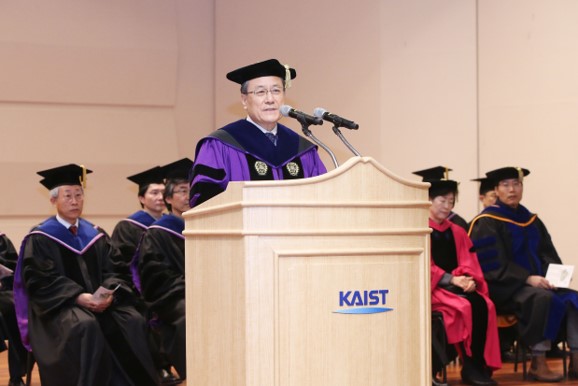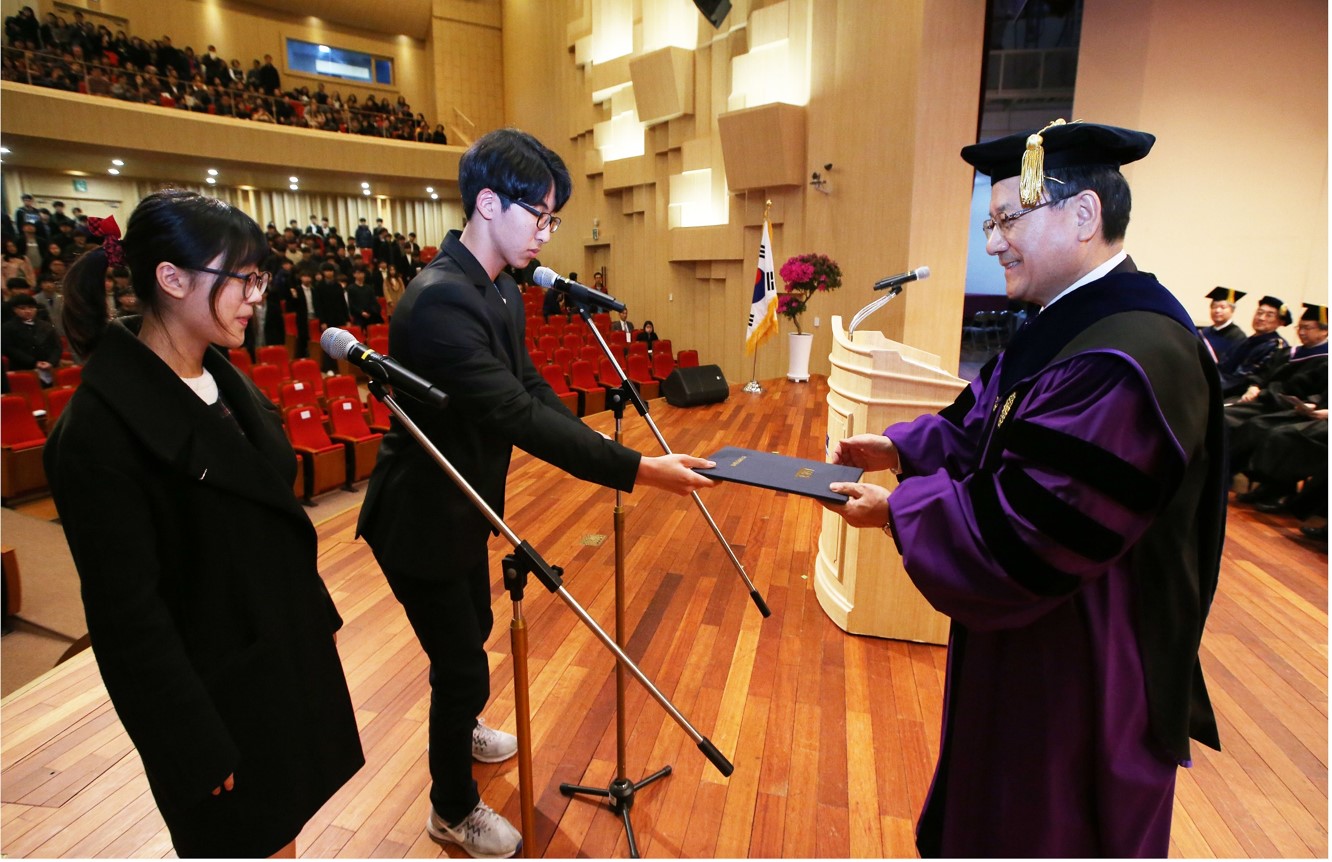policy

President Sung-Chul Shin welcomed 756 new undergraduates for 2017 during the Freshmen Convocation on February 27, urging them to be adamant in challenging themselves to become global leaders during the next four years and beyond at KAIST. Family, friends, faculty, and staff members cheered them on at the ceremony in the auditorium. The KAIST orchestra and chorus also celebrated the freshmen’s new start.
President Shin encouraged students to become global leaders by deepening their knowledge of basic studies as well as broadening their interdisciplinary spectrum while studying at KAIST.
“In the era of Industry 4.0, new discoveries will be made in interdisciplinary studies. Thus, I ask you to study humanities and social studies very diligently, the basis of creative research and development to broaden your knowledge spectrum. Conventionally, the science and technology fields are dominated by left-sided brains working while the humanities and social sciences are influenced by the right brain. KAIST will soon provide a new curriculum of full-brain teaching which will actively stimulate both sides of the brain. Such a new track will help students fully exercise their ingenuity, especially in comprehending the newest trends of science and technology,” he said.
He added, “Korea stands as one of seven most innovative nations with significant growth potential and the world is paying attention to us. You are the top 0.3 percent of science and technology talents in the nation who will be the leaders of our future. Thus, we plan to establish the Global Leadership Center in order to train our students to be outstanding leaders through their qualifications, manner, and mindset.”
He also cited communication skills as a critical aspect that every student, especially those majoring in science and technology, should focus on. “Communication is a critical tool for any scientist and leader. Students should study and learn how to better present themselves and deliver what they think more effectively and persuasively to others in the hyper-connected, horizontal society of the future. In particular, English communication skills are very crucial for engaging in leadership roles on the global stage.”
Finally, President Shin asked students to manage their time well in order to accomplish their goals. “Your future will be determined by what dreams you dream in college and how you prepare for it. I hope that your days at KAIST will be a time of diligent preparation for your ambitious dreams,” he added.
For full context of his speech, please click.

(Photo caption: President Shin makes a welcoming address at the 2017 Freshmen Convocation (above) and freshmen representatives present the oath of freshmen to President Shin.)
-
research KAIST sends out Music and Bio-Signs of Professor Kwon Ji-yong, a.k.a. G-Dragon, into Space to Pulsate through Universe and Resonate among Stars
KAIST (President Kwang-Hyung Lee) announced on the 10th of April that it successfully promoted the world’s first ‘Space Sound Source Transmission Project’ based on media art at the KAIST Space Research Institute on April 9th through collaboration between Professor Jinjoon Lee of the Graduate School of Culture Technology, a world-renowned media artist, and the global K-Pop artist, G-Dragon. This project was proposed as part of the ‘AI Entertech Research Center’ be
2025-04-10 -
event KAIST, Galaxy Corporation Hold Signboard Ceremony for ‘AI Entertech Research Center’
KAIST (President Kwang-Hyung Lee) announced on the 9th that it will hold a signboard ceremony for the establishment of the ‘AI Entertech Research Center’ with the artificial intelligence entertech company, Galaxy Corporation (CEO Yong-ho Choi) at the main campus of KAIST. < (Galaxy Corporation, from center to the left) CEO Yongho Choi, Director Hyunjung Kim and related persons / (KAIST, from center to the right) Professor SeungSeob Lee of the Department of Mechanical Engineer
2025-04-09 -
research KAIST Identifies Master Regulator Blocking Immunotherapy, Paving the Way for a New Lung Cancer Treatment
Immune checkpoint inhibitors, a class of immunotherapies that help immune cells attack cancer more effectively, have revolutionized cancer treatment. However, fewer than 20% of patients respond to these treatments, highlighting the urgent need for new strategies tailored to both responders and non-responders. KAIST researchers have discovered that 'DEAD-box helicases 54 (DDX54)', a type of RNA-binding protein, is the master regulator that hinders the effectiveness of immunotherapy—opening
2025-04-08 -
research KAIST Develops Retinal Therapy to Restore Lost Vision
Vision is one of the most crucial human senses, yet over 300 million people worldwide are at risk of vision loss due to various retinal diseases. While recent advancements in retinal disease treatments have successfully slowed disease progression, no effective therapy has been developed to restore already lost vision—until now. KAIST researchers have successfully developed a novel drug to restore vision. < Photo 1. (From left) Ph.D. candidate Museong Kim, Professor Jin Woo Kim, a
2025-03-31 -
research KAIST provides a comprehensive resource on microbial cell factories for sustainable chemical production
In silico analysis of five industrial microorganisms identifies optimal strains and metabolic engineering strategies for producing 235 valuable chemicals Climate change and the depletion of fossil fuels have raised the global need for sustainable chemical production. In response to these environmental challenges, microbial cell factories are gaining attention as eco-friendly platforms for producing chemicals using renewable resources, while metabolic engineering technologies to enhance these
2025-03-27